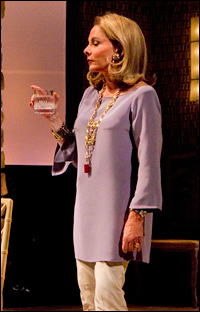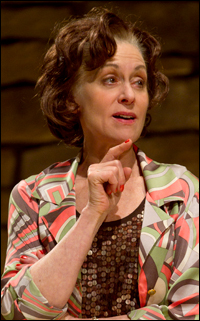
*
Spending Christmas with squabbling relatives is no one's idea of a good time — unless they're the Palm Springs-dwelling Wyeths of Jon Robin Baitz's Other Desert Cities: perfectly coiffed ex-screenwriter Polly (Stockard Channing) and her fellow Reaganite hubby, actor-turned-politician Lyman (Stacy Keach); their liberal, California TV-producer son Trip (Thomas Sadoski) and even more liberal New York-author daughter Brooke (Rachel Griffiths); and Polly's ultra-liberal, newly sober sister Silda (Judith Light).
Polly's water "needs vodka for flavor," Brooke's fresh out of rehab, and a lively post-tennis conversation involves weapons of mass destruction, Ron and Nancy, and counseling. And this is all before Brooke unveils her tell-all memoir that contains enough emotional ammunition to annihilate the entire family. Heck, this is all before breakfast. Why would you want to spend Christmas anywhere else?
For anyone who couldn't get to Other Desert Cities Off-Broadway last winter, Lincoln Center Theater has transferred it to the Booth Theatre, where Baitz, who is known as Robbie, is making his long-awaited Broadway bow as a playwright. Also making her Main Stem debut: Australian actress Griffiths, fresh from five seasons on the TV series Baitz created, "Brothers & Sisters." We sat down with stars Channing, Griffiths and Light — who's also new to Desert — on the first day of their two-week rehearsal period. Two weeks? "It's very short," laughs Griffiths. "But it's a very loooong television rehearsal period."
Playbill: What's it like to come into this production as a new cast member? Griffiths: I just wake up every day and say, "Don't f--k it up." I saw this incredible production, so in some ways it makes me secure — because I have no anxiety about whether or not this play's going to work.
 |
||
| Stockard Channing |
||
| photo by Joan Marcus |
Griffiths: It does? I haven't been playing dry!
Playbill: Silda is "a mess, no makeup, hair disheveled...wearing a muumuu..."
Griffiths: You shouldn't have told me that! I'm going to be focused on how dry I am.
Channing: I originally didn't want to play [Polly]. I read the script out of respect for Robbie and [director] Joe [Mantello]. But I was very surprised when we read it out loud how moving it was and how it lifted. I really was not drawn to this person. This woman is not exactly who I am.
Playbill: I was surprised by how much sympathy I had for her.
Channing: I have a friend who saw one of the first previews. We went for a drink after, and she said, "If I ever thought I'd be crying for some white Republican woman..."
Griffiths: I was!
Playbill: But then I'd think, "Doesn't Brooke have a right to write her book?" My allegiances were constantly shifting.
Channing: I've heard that a lot.
Light: Nobody's wrong and nobody's right, which is what makes this play so brilliant.
 |
||
| Judith Light |
||
| photo by Joan Marcus |
Griffiths: I think she's the easiest! Her need is just so clear. I did text Robbie at one point. I was like [pretending to text], "Why would we like this girl? I mean, what she's doing is not very nice." And [later] I thought, "Why did I even waste his time?" I understood. I guess I've made somewhat of a career of playing psychically demanding girls who are somewhat disorganized and insist on being heard. I don't know if I have a particular window onto that.
Light: It's your brand!
Griffiths: Is that my brand? [Laughing]
Channing: I still listen in rehearsal. These very articulate human beings... They can be harsh and they can be rough but they're not unkind. There's none of that creepy, crappy stuff. No manipulation. And they love each other. All these relationships are not echoing that dysfunctional-family cliché. There's something invigorating about these five people that an audience responds to. I think that's why people shift positions. "Oh, actually he's right." "She's got a point there." "I didn't think I'd like her but I agree with what she said!"
Light: Invigorating really is the word!
Griffiths: Momentarily you buy into certain clichés: Oh, that's the hippy drunk aunt. This is the mother that can't love, that's frozen in her social self-consciousness. I'm the needy girl that puts art before life. And all the stereotypes exist momentarily, only to be dismantled to find three human and relatable people.
Light: That first scene when you guys read it yesterday — it was thrilling. And funny. And illuminating and charming. It's like — who are these people? Oh! This is who they are. Oh, no — that's not who they are.
Griffiths: This is a window into a kind of micro-world. I feel like I've seen the East Coast Jewish or WASP version of this family, and their unhappiness lives in a different place.
People are like, "What's the play about?" I'm like, "It's kind of like an American West Coast melodrama delivered wearing a resort collection." Because it has a breeziness to it. It's fabulous.










